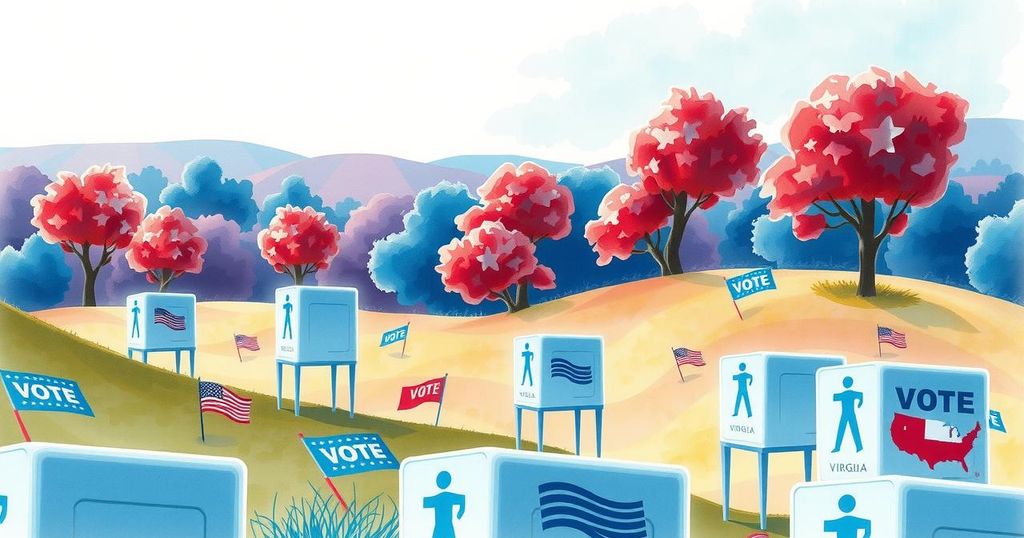World news
AFRICA, CHRIS CHRISTIE, COMMONWEALTH, DEMOCRATS, ELECTION, GEORGE H. W. BUSH, GLENN YOUNGKIN, LEGISLATION, MCAULIFFE, NEW JERSEY, PEW, PEW RESEARCH, POLL RESULTS, PRESIDENTIAL CANDIDATES, PRESIDENTIAL ELECTION 2024, SENATE, SOUTH AFRICA, TIM KAINE, U. S, U. S. SENATE, US ELECTIONS, VIRGINIA
Sofia Rodriguez
0 Comments
Significance of Virginia’s 2025 Gubernatorial Election
Virginia’s 2025 gubernatorial election is crucial as it will serve as a key indicator of national sentiment towards the presidential administration. The state has trended Democratic recently, yet its election history shows a tendency to swing against the incumbent party. Current polling suggests a lead for Democratic nominee Abigail Spanberger, but Virginia elections are often closely contested, indicating unpredictable outcomes ahead.
As the political spotlight shifts to Virginia’s gubernatorial election in 2025, the stakes could not be higher. The Commonwealth, alongside New Jersey, is one of the only two states holding gubernatorial elections that year. This race is particularly significant because Virginia’s political trends can often signal national sentiment regarding the presidential administration’s performance. Despite New Jersey’s long-standing Democratic leanings, Virginia’s elections have historically been seen as more pivotal.
Virginia’s political landscape has transformed notably over the years. While the state leaned Republican from 1968 until 2004, it pivoted towards Democratic candidates starting in 2008. This shift has been underscored by the election of Democratic governors and U.S. senators like Mark Warner and Tim Kaine in recent cycles. However, the unique structure of Virginia’s gubernatorial elections, which prohibits consecutive terms for governors, introduces an interesting dynamic.
Interestingly, from 1977 to 2013, Virginia opted for a governor from the opposite party of the sitting president with remarkable consistency. Even though Virginia voted for Democrats at the federal level in both 2020 and 2024, Republican Glenn Youngkin managed to seize the governorship in 2021. This tendency towards flipping gubernatorial candidates places the upcoming election in Virginia as a significant barometer for national politics, especially in the realm of assessing Donald Trump’s potential return to the White House in 2024.
Polls currently suggest a favorable outlook for Democrats, particularly for Abigail Spanberger, who is the Democratic nominee for governor. Some polls indicate she is leading early on. However, caution is advised; historical context indicates that Virginia elections can be fiercely competitive. The races in 2013 and 2021 were both remarkably close, with margins well within three percentage points. Polling might indicate a lead, but the unpredictable nature of these contests can quickly alter the playing field.
For instance, in 2013, Terry McAuliffe entered the election with a strong polling advantage, but the results were much tighter than expected. Fast forward to 2021, and when McAuliffe sought a second term, his polls showed promise until late in the campaign when Republicans began to gain momentum. This unpredictability is exactly what makes the upcoming election intriguing yet complex.
Regardless of the outcome, the implications for both parties are clear. The losing party will have to reevaluate its approach moving forward, especially as the 2026 Senate and House races loom on the horizon. As the campaign season heats up, early voting for party primaries has already commenced in Virginia. For those interested in staying informed, more details can be found on the Virginia Department of Elections’ website.
The 2025 gubernatorial election in Virginia is poised to be a pivotal moment both for the state and the nation. With the potential to reflect voter attitudes towards the current presidential administration, the election could shift party strategies significantly. As polls tighten and early voting begins, attention will be closely focused on how the results may shape upcoming political contests across the United States.
Original Source: www.wsls.com




Post Comment